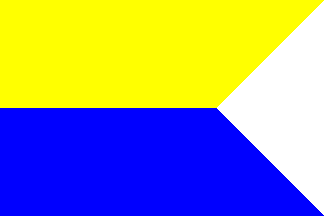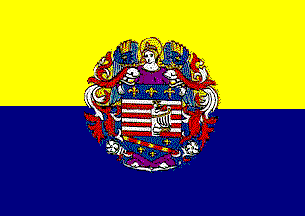This page is best viewed with ISO:8859-2, aka Latin2, aka Central European fonts See also:
Košice flag
 submitted through Rob Raeside, 20 July 1999
submitted through Rob Raeside, 20 July 1999
Košice is the metropolis of eastern Slovakia and the second biggest
Slovakian city; it is situated on the eastern border of the 'Slovak ore
mountains' and the kosice basin, on the terrace platform of the Hornad
river at the crossing of the old significant ways which had a great influence
on the destiny of this city. The town's population in 1992 was 237.000.
The Hungarian name is Kassa, German: Kaschau. It was originally a city
of northern Hungary and became part of Czechoslovakia in 1918. It was held
by Hungary 1938-45, but returned to Czechoslovakia.
Jarig Bakker, 30 Sept 2000
Official Košice flag

From the Košice
website.
The flag sent to the FOTW-ml of Košice is a swallowtail yellow blue
flag. At this site
is an animated gif of a rectangular flag (when fully stretched that is)
with a full CoA towards the hoist. The flag is very small and the CoA is
not very visible; however at this
page is a CoA with ornamentation which looks like the CoA on
the flag. The shield is at this page.
Jarig Bakker, 27 Mar 2000
However, this can't legaly be the city flag of Košice (OK, unless there
is some exception). As we were informed by Pascal Vagnat on 25-JUL-1999,
the Slovak cities have a wide variety of symbols legally defined from which
they can choose and none of them include a flag as displayed on the mentioned
site. See: Slovakian Flaglaws.
Regarding the story of "the oldest documented CoA in Europe" of Košice,
one can easily understand why they are so eager to include it on their
flag. Maybe the official flags do not have it, but it would not surprise
me to find out that the official flags are hard to be seen in the city
and that the flag with COA is much more "popular".
Zeljko Heimer, 29 Mar 2000
The official flag is in the picture on this
website. This official flag is from 1994. The history of arms (on flag):
look on this page.
Anna Kandracova, MAGISTRAT mesta KOSICE webmaster.
Košice Mayor's flag
![[Kosice mayor's flag]](../images/s/sk-kosi3.gif) This is from the Košice
website.
This is from the Košice
website.
Jarig Bakker, 20 Apr 2000
I notice that the arms of Košice bear an angel supporter behind the
shield. Are these angels in so many Slovak arms a reference to those that
guard the COA of Hungary?
Juan Morales, 9 Feb 1999
Well, when your nation is under the control of another for 1024 years,
I'd say that some heraldic traditions get adopted by each other.
I also have a number of friends in Kassa (Košice), and from what they tell
me, it's quite a Hungarian stronghold in Slovakia. Two possible answers.
Pick whichever one you like best.
Georges G. Kovari III, 10 Feb 1999
Košice flag of 1941
![[Kosice flag of 1941]](../images/s/sk-ke41.gif) by Jan Kravcik, 13 June 2000
by Jan Kravcik, 13 June 2000
Older flag mentioned in 1941 by S. Széll. There is also one flag in
Východoslovenské museum in Košice which has the Hungarian coat of arms
on the obverse and the municipal coat of arms on the reverse side.
Source: 'Városaink neve, címere és lobogója' by S. Széll, Budapest
1941.
Jan Kravcik, 13 June 2000
The flag was given by the Hungarian king in 1369.
István Molnár, 20 Oct 2000
Košice flag of 1979
![[Kosice flag of 1979]](../images/s/sk-ke79.gif) by Jan Kravcik, 13 June 2000
by Jan Kravcik, 13 June 2000
The flag used (not only) in the time of socialism.
Source: 'Klíc k našim mestum' by Karel Liška and Ludvík Mucha,
ed. Práce in Prague, 1979.
Jan Kravcik, 13 June 2000
Košice Coat of Arms
kosic.gif) from the downtown Košice website.
from the downtown Košice website.
Jarig Bakker, 20 Febr. 2000
The arms were granted in 1369 and Košice is the city with the oldest
still existing document of granting of arms. The original arms only showed
the eagle and the bars, all later symbols are later additions. The arms
as they are in use at present, date from 1502 and haven't changed since.
Jarig Bakker, 20 Febr. 2000
